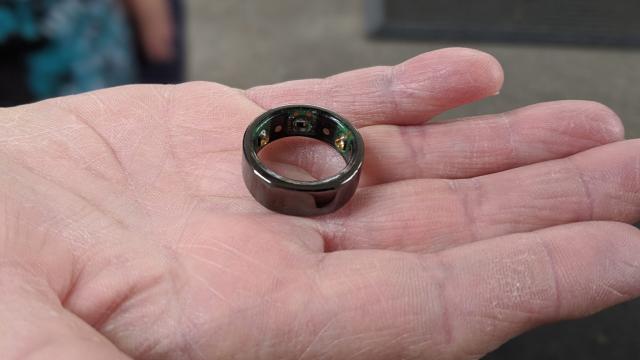No wearable device, whether it’s a smartwatch, fitness tracker, or smart ring, is currently capable of diagnosing covid-19. That’s it, full stop.
Plenty of headlines have described how wearables companies are teaming up with medical researchers to see if their devices can detect symptoms early. So far, the research indicates that wearables may be able to detect infectious diseases early. But that doesn’t mean any device can actually predict who is or isn’t going to get covid-19.
The makers of Oura Ring, a sleep- and activity-tracking ring, in April announced they were teaming up with researchers at the West Virginia University Rockefeller Neuroscience Institute (RNI) for a national study “designed to accelerate early detection of the covid-19 virus symptoms.” The company also partnered with the University of California San Francisco to see how the ring might be helpful for early detection.
The RNI said it has created a digital platform that can detect symptoms related to covid-19 up to three days before they actually appear with a 90 per cent accuracy rate. The platform is a combination of an app developed by RNI, the Oura Ring, and artificial intelligence models. It tracks a variety of data points, including “body temperature, heart rate variability, resting heart rate, respiratory rate, sleep and activity patterns, and “˜readiness’ ” a health metric combining long-term sleep and activity trends with short-term behaviours,” RNI said. It also required study participants to self-report their stress, anxiety, memory, and “other human resilience and recovery functions.”
The fact that early studies indicate that wearables can detect symptoms before people notice them gives us some hope, but researchers and reporters who definitively declare that gadgets can “predict” or “diagnose” covid-19 in headlines should really stop doing that. In this case, those reports imply that Oura Ring owners will know whether they’ll get covid-19, even if they’re asymptomatic. But the reality is wearing a device like the Oura Ring may simply help you figure out that something is off compared to your normal baseline, which could indicate something more serious is going on. As a whole, we’re nowhere near done studying whether wearables might be effective at early detection. It bears repeating: No device on the market can currently predict or diagnose covid-19. No device has been cleared by by the U.S. Food and Drug Administration for this purpose.
For starters, according to RNI’s press release, these preliminary results are from 600 healthcare professionals and first responders. That’s not exactly a huge sample size. Covid-19 hasn’t been around for very long, and there’s still a lot we don’t know about it. A 90 per cent accuracy rate for 600 people is a good start, but it’s by no means definitive. However, RNI did indicate that it’s working with partners to scale up the study to more than 10,000 participants in the second phase.
It’s also crucial to note that RNI says it can detect “covid-19 related symptoms.” That does not mean it can tell you whether you have covid-19. It means researchers believe they can identify symptoms that are associated with covid-19 a few days before they start. But those symptoms could also be related to other types of illnesses. We still don’t know if wearables can differentiate between respiratory infections like the flu or pneumonia, which share some symptoms with covid-19.
Another note: RNI has not publicly released the study’s methodology for these initial results, and the institute did not explicitly state in its releases whether they intend to submit the final study to a peer-reviewed journal when the results are wrapped up. Gizmodo asked RNI if they could provide the study results, if they plan to submit their findings, and if there are plans to consult with the FDA about early detection features in the future. We did not immediately receive a response.
Submitting results for peer review is important, because an app that can detect infection would be considered medical by nature. Any consumer product that advertises diagnostic abilities requires the FDA’s stamp of approval before it goes on sale. It’s vitally important that tech companies get it right when it comes to alerting people that they have symptoms consistent with covid-19 ” and what they should do next. And when communicating these incredibly promising studies to the public, it’s also on PR departments and reporters to clearly state these distinctions ” even if the headline is less exciting.
These preliminary results show potential ” and it’s genuinely good that Oura and many other wearable makers are participating in this research. Fitbit is sharing its data with researchers and conducting its own study about early covid-19 detection. Both Fitbit and Oura are also participants in Stanford University’s study, which is looking to do the same thing. These are just a few of the ongoing studies out there right now.
We may one day get notifications on our wrists before a covid-19 infection sets in. That day is not today, and likely won’t be coming for a long while yet.
